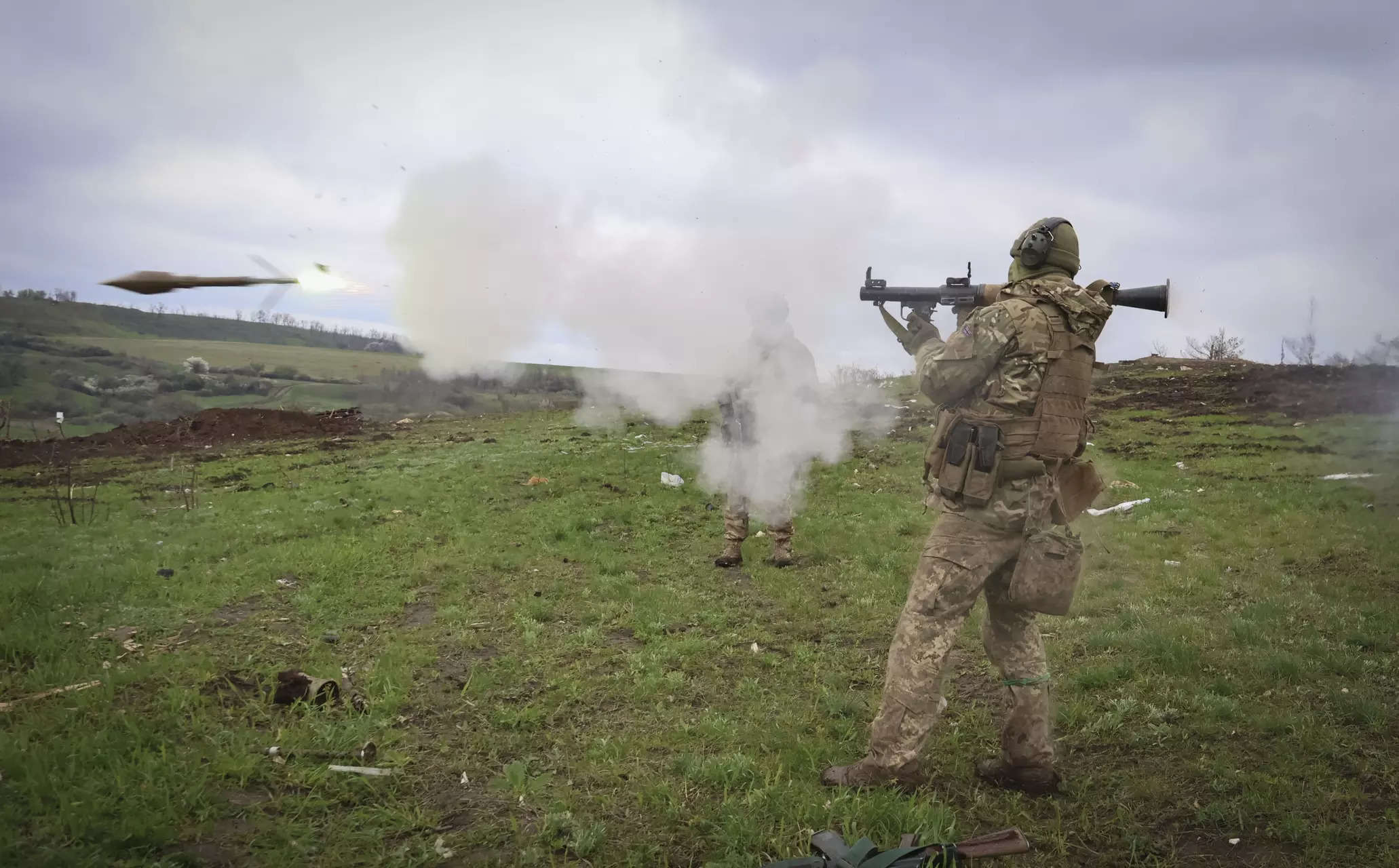World
G-7 to back Ukraine indefinitely, seeks stability with China

[ad_1]
The Group of Seven nations vowed to support Ukraine for “as long as it takes” in its fight against Russian forces, while also calling for greater engagement with China to stabilize relations with the world’s second-biggest economy.
In a communique released Tuesday after top G-7 diplomats met in Japan, the bloc condemned Russia’s war against Ukraine “in the strongest possible terms.” The nations reiterated support for Ukrainian leader Volodymyr Zelenskyy’s peace plan, while slamming Russia’s “irresponsible nuclear rhetoric.”
“We recommit today to supporting Ukraine for as long as it takes and to providing sustained security, economic, and institutional support to help Ukraine defend itself, secure its free and democratic future, and deter future Russian aggression,” the statement said.
The G-7 ministers also said they recognized the importance of “engaging candidly” with China and the need to work together on common interests, while calling for a “peaceful resolution” of Taiwan-related issues. It also expressed concern about China’s growing nuclear arsenal and called for talks with the US on arms control.
The ministers added that there was “no change in the basic positions of the G-7 members on Taiwan, including stated one-China policies” — pushing back on Beijing’s claims that the US in particular is seeking to change the status quo.
The language on China in the communique, notably softer than the heated rhetoric often heard in Washington, comes as the group seeks to project unity after key differences emerged following Emmanuel Macron’s recent trip to Beijing. The French leader said the European Union should avoid being dragged into a dispute with China by the US, remarks that helped advance Chinese President Xi Jinping’s goal of stoking divisions between American allies.
German Foreign Minister Annalena Baerbock, who also attended the meetings in Japan, on Monday underscored that Germany wouldn’t compromise on its values when it comes to engaging with China.
“I made clear in China: We want to cooperate, we want to be partners, but we are not naive,” she told reporters in Japan.
During the meetings, which also included French Foreign Minister Catherine Colonna, diplomats agreed on an approach that emphasized trying to cooperate with Beijing wherever possibly, while de-risking their economic reliance on China and sending clear signals that Chinese weapon deliveries to Russia — as well as military escalation with Taiwan — would be unacceptable, an official familiar with the matter said.
The US hasn’t had high-level meetings with Beijing since President Joe Biden met Xi late last year, as the shooting down of an alleged Chinese spy balloon prompted Blinken to cancel a long-planned trip to China. Ties only worsened following Taiwan President Tsai Ing-wen’s unprecedented meeting on US soil with House Speaker Kevin McCarthy, which prompted China to launch military exercises.
Ukraine Peace Plan
One key question has been the extent to which G-7 nations should engage with Xi’s vague peace blueprint for Ukraine, which has received backing from emerging economies in the so-called Global South.
On a trip to Beijing last week, Brazilian President Luiz Inacio Lula da Silva told reporters it was “important that the US stops encouraging war and starts talking about peace.” His government then invited Russian Foreign Minister Sergei Lavrov to the South American country, where Brazil Foreign Minister Mauro Vieira criticized sanctions imposed by the US and its allies.
While the US and its allies have dismissed any cease-fire proposal that would allow Russia to keep territorial gains, some countries like France have welcomed China’s effort to find a diplomatic resolution. The G-7 ministers endorsed Zelenskyy’s “Peace Formula,” which includes the complete withdrawal of all Russian troops from Ukrainian territory.
‘China Nuclear Threat’
The G-7 has translated its close coordination on arming Ukrainian forces over the last year into a renewed dialogue on the challenges presented by China, a senior State Department official told reporters on Monday evening. The group sees the need to stay engaged with China while standing up against any coercive measures or efforts to change the status quo in Taiwan, the official said.
Ahead of a G-7 leaders summit in Hiroshima next month, the foreign ministers also discussed how to provide critical infrastructure investments across the developing world in order to give countries a high-quality alternative to Chinese investments, the official said.
The US has long sought to engage China in talks on its nuclear weapons, to no avail. Beijing in turn accuses the US of hyping up the “China nuclear threat” as an excuse to expand its own stockpile, saying that China maintains a defensive policy that includes no first-use of nuclear weapons and an arsenal at a minimum level for national security.
“As the G-7 we shared concerns about China’s expanding nuclear arsenal and affirmed the importance of transparency,” Japanese Foreign Minister Yoshimasa Hayashi told reporters on Tuesday. “We strongly urged China to swiftly join talks with the US aimed at reducing strategic risks.”
In a communique released Tuesday after top G-7 diplomats met in Japan, the bloc condemned Russia’s war against Ukraine “in the strongest possible terms.” The nations reiterated support for Ukrainian leader Volodymyr Zelenskyy’s peace plan, while slamming Russia’s “irresponsible nuclear rhetoric.”
“We recommit today to supporting Ukraine for as long as it takes and to providing sustained security, economic, and institutional support to help Ukraine defend itself, secure its free and democratic future, and deter future Russian aggression,” the statement said.
The G-7 ministers also said they recognized the importance of “engaging candidly” with China and the need to work together on common interests, while calling for a “peaceful resolution” of Taiwan-related issues. It also expressed concern about China’s growing nuclear arsenal and called for talks with the US on arms control.
The ministers added that there was “no change in the basic positions of the G-7 members on Taiwan, including stated one-China policies” — pushing back on Beijing’s claims that the US in particular is seeking to change the status quo.
The language on China in the communique, notably softer than the heated rhetoric often heard in Washington, comes as the group seeks to project unity after key differences emerged following Emmanuel Macron’s recent trip to Beijing. The French leader said the European Union should avoid being dragged into a dispute with China by the US, remarks that helped advance Chinese President Xi Jinping’s goal of stoking divisions between American allies.
German Foreign Minister Annalena Baerbock, who also attended the meetings in Japan, on Monday underscored that Germany wouldn’t compromise on its values when it comes to engaging with China.
“I made clear in China: We want to cooperate, we want to be partners, but we are not naive,” she told reporters in Japan.
During the meetings, which also included French Foreign Minister Catherine Colonna, diplomats agreed on an approach that emphasized trying to cooperate with Beijing wherever possibly, while de-risking their economic reliance on China and sending clear signals that Chinese weapon deliveries to Russia — as well as military escalation with Taiwan — would be unacceptable, an official familiar with the matter said.
The US hasn’t had high-level meetings with Beijing since President Joe Biden met Xi late last year, as the shooting down of an alleged Chinese spy balloon prompted Blinken to cancel a long-planned trip to China. Ties only worsened following Taiwan President Tsai Ing-wen’s unprecedented meeting on US soil with House Speaker Kevin McCarthy, which prompted China to launch military exercises.
Ukraine Peace Plan
One key question has been the extent to which G-7 nations should engage with Xi’s vague peace blueprint for Ukraine, which has received backing from emerging economies in the so-called Global South.
On a trip to Beijing last week, Brazilian President Luiz Inacio Lula da Silva told reporters it was “important that the US stops encouraging war and starts talking about peace.” His government then invited Russian Foreign Minister Sergei Lavrov to the South American country, where Brazil Foreign Minister Mauro Vieira criticized sanctions imposed by the US and its allies.
While the US and its allies have dismissed any cease-fire proposal that would allow Russia to keep territorial gains, some countries like France have welcomed China’s effort to find a diplomatic resolution. The G-7 ministers endorsed Zelenskyy’s “Peace Formula,” which includes the complete withdrawal of all Russian troops from Ukrainian territory.
‘China Nuclear Threat’
The G-7 has translated its close coordination on arming Ukrainian forces over the last year into a renewed dialogue on the challenges presented by China, a senior State Department official told reporters on Monday evening. The group sees the need to stay engaged with China while standing up against any coercive measures or efforts to change the status quo in Taiwan, the official said.
Ahead of a G-7 leaders summit in Hiroshima next month, the foreign ministers also discussed how to provide critical infrastructure investments across the developing world in order to give countries a high-quality alternative to Chinese investments, the official said.
The US has long sought to engage China in talks on its nuclear weapons, to no avail. Beijing in turn accuses the US of hyping up the “China nuclear threat” as an excuse to expand its own stockpile, saying that China maintains a defensive policy that includes no first-use of nuclear weapons and an arsenal at a minimum level for national security.
“As the G-7 we shared concerns about China’s expanding nuclear arsenal and affirmed the importance of transparency,” Japanese Foreign Minister Yoshimasa Hayashi told reporters on Tuesday. “We strongly urged China to swiftly join talks with the US aimed at reducing strategic risks.”
#Ukraine #indefinitely #seeks #stability #China






